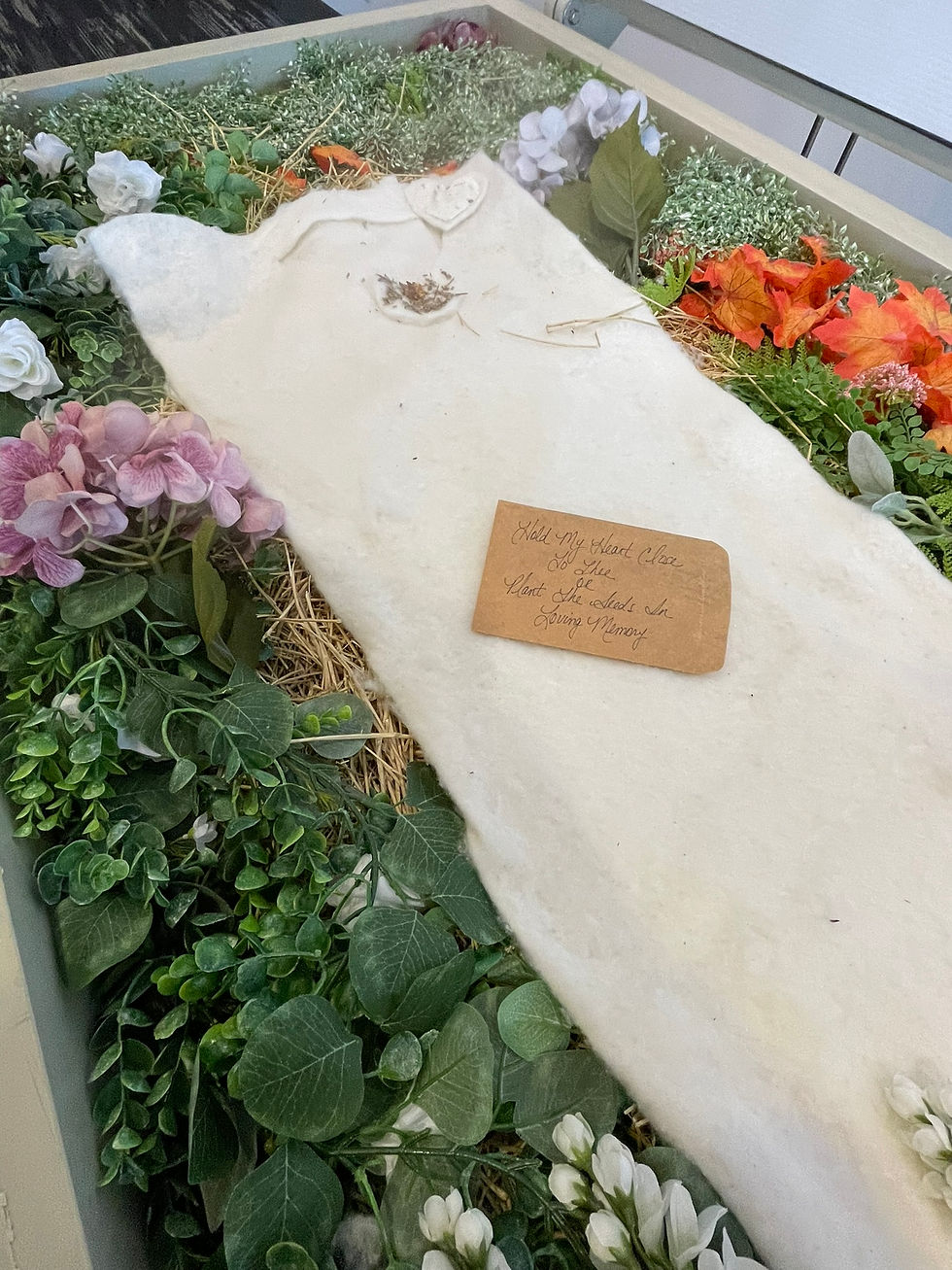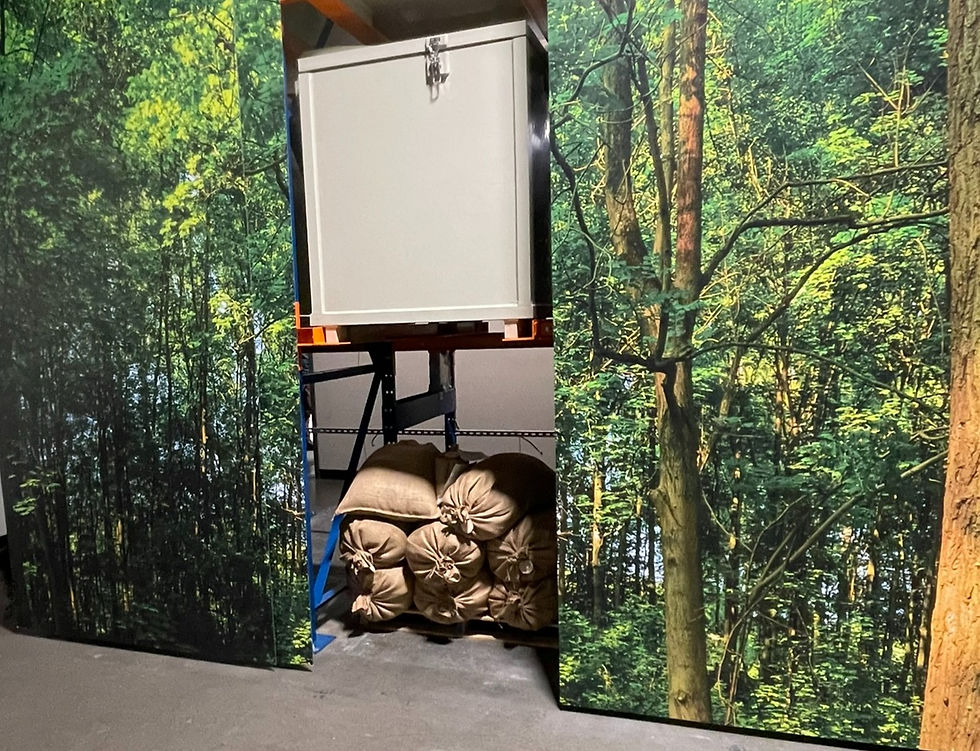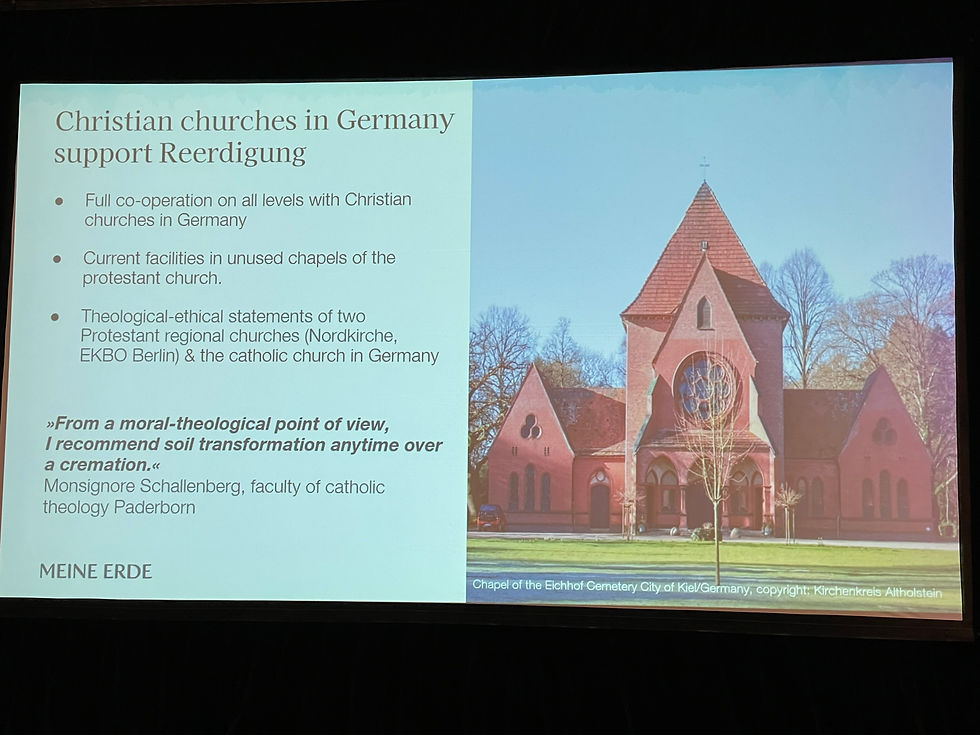This week I found myself in a place I truly never envisioned being... front row at TerraCon - a first of it's kind conference designed to connect, inform, and activate an international audience with a shared interest the composting of human remains, also known as, Natural Organic Reduction (NOR).
I know it sounds strange but give me a few paragraphs to explain...

In addition to the fairly odd circumstances, I found myself in equally unfamiliar company... A retired State Senator, the Owner and Communications Director from a local family funeral home, a University of Minnesota mortuary science student, and her Instructors.

While I was far from certain what the coming days would bring, I found comfort in knowing we had the following in common...
We all made the trek from the great state of Minnesota
We all shared, to varying degrees, a curiosity for the budding practice of NOR
We all had questions and hoped TerraCon could provide answers
We all will eventually die. Dark but guaranteed and, ultimately, someone will have to figure out what to do with us.
Reflecting back on the past week, I can confidently say the following...

These unfamiliar folks are now friends - there's even photo evidence >>>
The process of NOR has progressed from somewhat mysterious to understood and deeply moving
The folks driving NOR efforts in WA and beyond are swiftly and artfully reshaping death care as we know it, and...
When I die, I (still) want to be compost!!
Now, on to the TerraCon Takeaways!
To summarize the sentiments outlined above, I've come up with the following TerraCon Takeaways...
Give folks the choice they need, and they will come back full
Time slows down with this process... and that can be a good thing
In with the new AND (in) with the old
While my reflections are primarily on the human interactions and emotional impacts of this new process, the biggest TerraCon takeaway was ultimately that this process is legit.

We visited operating facilities first hand; connected with the scientists, engineers, funeral directors, and operating staff that run them; and spoke to families and friends that have leveraged NOR for their loved ones.
NOR is vetted, safe, real, meaningful, and growing rapidly.
We'll get more into the technical stuff on later posts but if the three takeaways above spark your interest, read on...
Pictured left to right (1) Service space at Return Home, (2) map pinpointing states where residents have used Return Home's services, including MN, (3) Entry / lobby at Return Home
1. "Give folks the choice they need, and they will come back full"
While we will all one day die, the circumstances and associated grief surrounding death is not and never will be created equal. This was reiterated through dozens of personal narratives throughout the conference. Brave parents told the story of losing their children; wives, the loss of their partners; religious leaders, the loss of community members; and funeral directors supporting those navigating loss in their community.
One of the most powerful statements from the latter, a funeral director who partnered with Return Home to offer NOR despite initial reservations on the process, said "give folks the choice they need, and they will come back full."
Choice, or lack thereof, was a critical component that rang true through each of the narratives we heard this past week. Whether or not to see, touch, or care for your loved one in the moments, hours, or days after their death. To hold space for ceremony, private or public, religious, spiritual, or otherwise. To bury or cremate.
Death, as in life, presents a multitude of decisions but modern practices have increasingly limited our choices in these moments in ways both real and perceived.
More than anything, I walked away from this conference with the deep belief, barring unsafe practice and/or harm to others, in expanding our freedom of choice in death. Whether it aligns with your beliefs or personal preferences, NOR has been proven safe and meaningful, and should be made available for those who are interested. For this reason, folks are wandering to Washington from all over the US including Minnesota.
The Minnesota pin pictured above signifies Steve Wheeler, a Lake Elmo, MN resident who worked with local funeral home Mueller Memorial to have his body sent to Return Home last year. Hear from him directly.
2. Time slows down
When I reflect on the days following my mother-in-law's passing, the feeling that quickly comes to mind is a frantic sense of urgency. Inform family and friends; schedule a memorial, write and publish the obit; collect pictures, narratives, memories; connect with the venue, celebrant, order food, etc... the list went on and on and the window seemed to keep shrinking. No time to grieve, we must plan!
One of the most moving statements I heard at TerraCon was from a mother who had decided on NOR for her son's disposition. She said, the process "helped to slow down something that was so sudden."

From a practical perspective, the process of composting takes time. While some may see this as a burden, the folks choosing this process with and for their loved ones found it to be a blessing. The opportunity to be present at the laying in; to visit the vessel on-site over the next couple of months - sit with their loved one, literally feel the warmth generated by the process, and be among others in community, formally or informally, who too are navigating loss; to pick-up the compost, carry it home, distribute it throughout the garden, among friends and family, across the many places near and far they called home; and to revisit the garden, the Japanese Maple, the local park or nature preserve where that compost contributes to a ever-dynamic environment.
Over half of the folks holding their celebration of life at Return Home wound up coordinating additional gatherings. Grief is not a one and done scenario and, while I would not expected everyone to reconvene after a celebration of life, there is no reason why folks should not be able to if they feel so inclined. See Takeaway number one: "Give folks the choice they need, and they will come back full!"
Simply put, the time-frame of the NOR process and invitation to carry forward the celebration of life that is so often just a brief moment in time hits different. Time. slows. down.
Pictured left to right (1) Recompose's Gathering Space, (2) threshold vessel where decedents move from the Gathering Space to the Green House, (3) Recompose's NOR vessels
3. The old AND the new
NOR, in many respects, is a novel approach to the age old practice of traditional burial. This interplay is something that has interested me from day one.
People have had a long-standing interest in returning to earth in their passing. The motivations behind this practice have varied over time as have our approaches, informed by religious practice, policies around public health and safety, price and practicality.
The arrival of NOR certainly challenges these practices in many ways.
What is the timeline for grieving?
What does a viewing or visitation look and feel like?
What do we do with the remains of our loved ones after the chosen disposition method?
How do we establish a sense of permanent memorialization if disposition moves beyond the traditional cemetery plot and gravestone?
What I appreciated about the discussions at Terracon is that folks did not assume to have answers. Rather, they envision the introduction of this new process as an opportunity for open conversation - with individuals, with family members, with religious and spiritual communities and their leaders - to honor tradition while unpacking the realities of now - a much more mobile population, rapid urbanization, limited cemetery or green space, the environmental impacts of existing disposition methods, etc.

The Natural Funeral out of Colorado, for example, meets folks where they are by offering NOR alongside a rich variety of disposition methods. Alternatively, providers like Germany's Meine Erde are working in partnership with German churches to provide NOR on-site at unused chapels, burying the composted remains in full within adjacent church cemeteries.
Just as I imagine my future compost integrating with the existing soil and working within the unique constraints and opportunities of the surrounding ecosystem, NOR presents an opportunity for enriching dialogue about what it means to die in our day.
Join us on our journey!
If your interested in remaining tuned into this content, sign up for our newsletter and join us on our journey to become future compost!













Comentarios